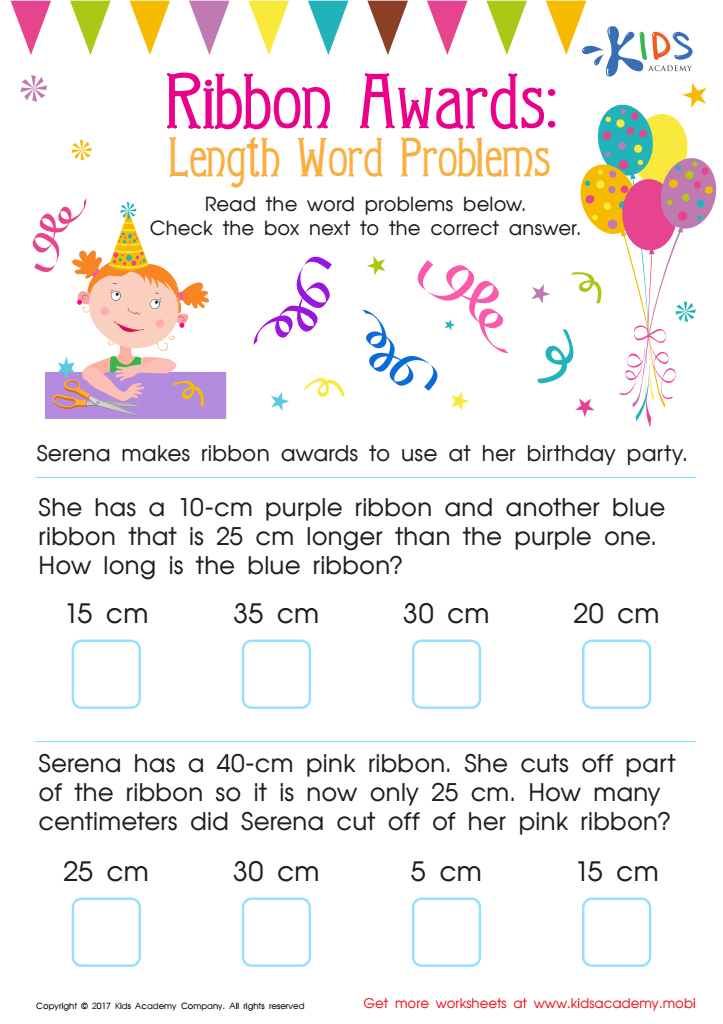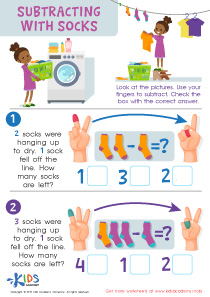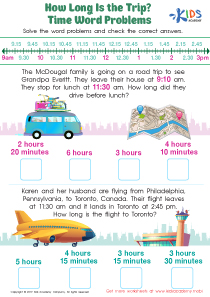Length and Mass Word Problems Worksheets for 4-Year-Olds
1 filtered results
-
From - To
Introduce your four-year-old to the fundamentals of measurement with our Length and Mass Word Problems worksheets. Perfectly tailored for young learners, these educational homework sheets are designed to engage and educate through fun and interactive problems. Each worksheet combines colorful visuals and simple, age-appropriate challenges that help kids understand the basic concepts of length and mass. Whether measuring objects with blocks or comparing weights, these sheets provide a solid foundation in early math skills, encouraging curiosity and confidence in young problem solvers. Make learning enjoyable and effective with our meticulously crafted educational resources!


Length Word Problems Worksheet
The Value of School Worksheets on Length and Mass Word Problems for Four-Year-Olds
In the formative years of a child's education, the foundation for critical thinking and problem-solving skills is established, and this is where school worksheets, specifically on topics like length and mass word problems, play a pivotal role. For four-year-old children, these worksheets are not just about learning numbers and measurements—they are gateways to understanding the world around them in a structured and engaging way.
Enhancing Cognitive Development
At the age of four, children are at a crucial stage of cognitive development. They begin to understand basic concepts of size, weight, and distance, but these are abstract ideas that are often challenging to grasp without the right tools. School worksheets designed around length and mass word problems help translate these abstract concepts into understandable, relatable scenarios. For instance, comparing the lengths of pencils, or weighing fruits, can make the learning process tangible and relatable.
Building Mathematical Foundations
Mathematics is not just about numbers; it's about understanding patterns, relationships, and problem-solving. Length and mass word problems introduce children to the idea of measurement in a practical and interactive manner. By engaging with these worksheets, children learn to compare, estimate, and analyze, which are essential skills for the more advanced math concepts they will encounter later in school. This early exposure ensures a smoother transition to formal schooling and more complex mathematical ideas.
Developing Language and Comprehension Skills
While primarily focused on math, working with length and mass word problems also significantly aids in language development. These school worksheets often use simple narratives to describe the problems. This storytelling aspect helps children improve their vocabulary and comprehension skills. As they read through the problems, they learn new words and concepts, improving their ability to follow instructions and describe what they see and think.
Encouraging Real-World Connections
One of the most significant advantages of using school worksheets that focus on length and mass is the ability to connect mathematical concepts to everyday life. Children begin to see the relevance of what they are learning when they apply it to familiar objects and situations. This not only makes learning more enjoyable but also helps them understand the practical utility of knowledge, which encourages a deeper curiosity and eagerness to learn.
Promoting Independent Learning and Confidence
As children work through these worksheets, they also learn to work independently, which is crucial for their academic confidence and self-esteem. Completing a worksheet provides a sense of accomplishment and encourages young learners to take on new challenges with enthusiasm. This is particularly important at a young age when confidence can significantly impact academic and social development. Worksheets on length and mass provide a structured way for children to explore problems at their own pace, make mistakes, and learn from them, all within a safe learning environment.
Tailored Learning Experiences
School worksheets can be customized to cater to the varied learning styles and paces of different children. For four-year-olds, who are notably diverse in their developmental stages, this means that worksheets can be adjusted for complexity—offering more straightforward or more challenging problems depending on the child's proficiency. This personalized approach helps prevent feelings of frustration and fosters an inclusive learning environment where every child feels valued and supported.
Fostering Parental Involvement
Another significant benefit of using school worksheets is the opportunity they create for parental involvement in their child's learning process. Length and mass word problems can be fun and interactive, allowing parents to engage with their children in solving problems together. This not only reinforces the learning but also strengthens the bond between the child and parent. Parents get a clear insight into what their children are learning and can help reinforce those concepts at home.
Preparing for Future Academic Challenges
Starting early with academic concepts such as length and mass prepares children for the types of analytical thinking they'll need in school. Early exposure to solving word problems can demystify complex subjects and foster a mindset geared towards inquiry and exploration. As they advance through different educational levels, these early lessons ensure they are well-prepared and capable of tackling more sophisticated math and science subjects.
Conclusion
In conclusion, school worksheets on length and mass word problems are not merely educational tools; they are building blocks for young learners. These worksheets help four-year-olds develop a range of skills from mathematical reasoning and language proficiency to confidence and independence. They offer a blend of cognitive challenge and fun, making learning a rewarding experience. By integrating these educational resources into early childhood education, we can provide children with a robust foundation that supports not only their academic growth but also their personal development. These early investments in child education are crucial for fostering capable, confident learners ready to navigate the challenges of the future.
 Assign to My Students
Assign to My Students









